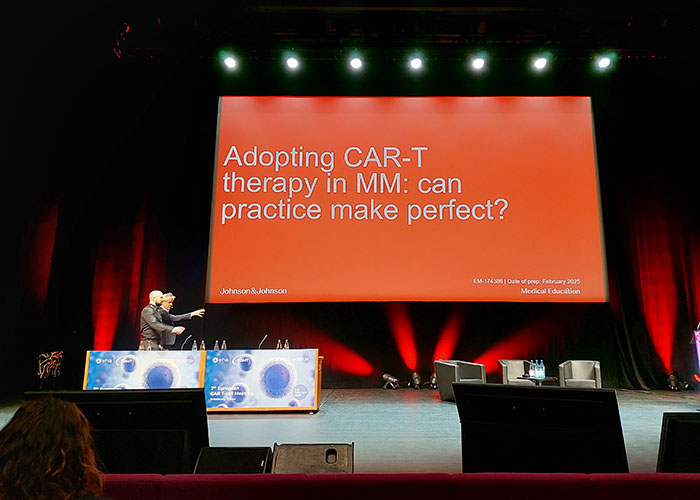
Multiple Myeloma (MM) is a hematologic malignancy characterized by the clonal proliferation of plasma cells in the bone marrow. Despite advances in proteasome inhibitors, immunomodulatory drugs, and monoclonal antibodies, MM remains largely incurable, with most patients eventually relapsing.
In recent years, chimeric antigen receptor T-cell (CAR-T) therapy has emerged as one of the most promising innovations for relapsed and refractory multiple myeloma (RRMM).
What Is CAR-T Cell Therapy?
CAR-T cell therapy is a form of immunotherapy in which a patient’s T cells are collected, genetically engineered to express a receptor that targets a specific cancer antigen, expanded in the lab, and then reinfused into the patient. These modified T cells are designed to recognize and destroy cancer cells with high specificity.
In MM, most CAR-T therapies target B-cell maturation antigen (BCMA), a protein highly expressed on malignant plasma cells but limited on healthy tissue.
FDA-Approved CAR-T Therapies for Multiple Myeloma
As of 2024, two BCMA-directed CAR-T therapies have received FDA approval for RRMM:
-
Abecma® (idecabtagene vicleucel)
- Approved: March 2021
- Indication: For adults with RRMM after four or more prior lines of therapy
- Clinical Data: The pivotal KarMMa trial showed an overall response rate (ORR) of 72% with a median progression-free survival (PFS) of 8.8 months.
Some patients achieved stringent complete responses.
-
Carvykti® (ciltacabtagene autoleucel)
- Approved: February 2022
- Indication: For patients who have received at least four prior lines of therapy
- Clinical Data: The CARTITUDE-1 study demonstrated an ORR of 98%, with 78% achieving stringent complete response. At two years, the overall survival (OS) rate was 74%.

Photo: #CART25 - European hematology conference in Strasbourg, France.
Key Advances and Ongoing Research
- Earlier Use in Therapy Lines
Traditionally used after multiple relapses, recent trials such as KarMMa-3 and CARTITUDE-4 are evaluating CAR-T earlier in the treatment sequence. CARTITUDE-4 showed superior PFS and response rates in patients treated after 1–3 lines of therapy compared to standard regimens . -
Dual-Targeting CAR-Ts
To prevent relapse due to antigen escape (loss of BCMA expression), researchers are developing dual-targeting CAR-T cells that simultaneously attack BCMA and another antigen such as GPRC5D or CD19 . - Allogeneic “Off-the-Shelf” CAR-Ts
While current therapies are autologous (patient-derived), research is ongoing into allogeneic CAR-T products using donor T cells. These could reduce wait times and manufacturing challenges, offering quicker access to therapy. - Combination Therapies
There is growing interest in combining CAR-T cells with immune checkpoint inhibitors, gamma secretase inhibitors, or lenalidomide to enhance their persistence and efficacy.
Challenges and Considerations
Despite their promise, CAR-T therapies are not without challenges:
- Toxicities: Cytokine release syndrome (CRS) and immune effector cell-associated neurotoxicity syndrome (ICANS) remain common adverse effects.
- Durability: While initial responses are often deep, some patients relapse within 12–24 months.
- Accessibility: Manufacturing time, cost, and specialized treatment centers can limit availability.
Conclusion
CAR-T cell therapy represents a major breakthrough in the treatment of multiple myeloma, offering renewed hope to patients with limited options. As clinical trials continue to push the boundaries—testing new targets, optimizing timing, and combining therapies—CAR-T is rapidly evolving into a cornerstone of MM management.
For patients and caregivers, understanding these developments can help inform timely decisions about participating in clinical trials or seeking treatment at centers offering CAR-T therapy.
Publication date: March 2025
Sources:
Munshi, N. C., et al. (2021). "Idecabtagene Vicleucel in Relapsed and Refractory Multiple Myeloma." New England Journal of Medicine.
Berdeja, J. G., et al. (2021). "Ciltacabtagene autoleucel, a BCMA-directed CAR-T therapy, in patients with relapsed/refractory multiple myeloma." Lancet.
Martin, T. et al. (2023). "CARTITUDE-4 Trial." ASCO Annual Meeting Abstracts.
Shah, N. et al. (2022). "Dual Targeting CAR T Cells in Multiple Myeloma." Blood Advances.
Brudno, J. N., Kochenderfer, J. N. (2020). "Recent advances in CAR T-cell therapy for multiple myeloma." Current Hematologic Malignancy Reports.







